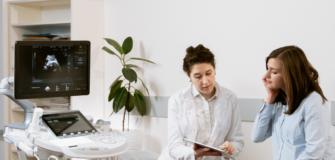i-REBOUND: world-first stroke recovery program launches in Newcastle
Share
i-REBOUND, an online resource portal co-designed by people living with stroke with researchers from HMRI and the University of Newcastle, is offering specialised support on the journey to stroke recovery.
Professor Coralie English and stroke survivor partner Meredith Burke have launched the program i-REBOUND developed in partnership with The Stroke Foundation to provide people who have had stroke access to expert, purpose-designed resources – helping them to eat well and move more.
Professor English, a member of the HMRI Heart and Stroke Research Program said i-REBOUND was the first step in what she hoped would become usual care for people to live well after a stroke.
“While there are plenty of programs that fit broadly under the banner of ‘stroke rehab’, this is the first website that focuses specifically on supporting people with stroke to eat well and move more to reduce the risk of a second stroke. There are no other websites that have exercise videos for people to follow that feature real people with stroke exercising for fitness, or recipes that are designed for people with stroke to follow, including a range of hints and hacks for cooking and eating well, one-handed.
“We want doctors and therapists to direct their patients to this resource and, with the right support and funding, we want to translate it into multiple languages and ensure that it is culturally appropriate for a wide range of people.
“Our ultimate goal is to offer individualised support to people recovering from stroke to encourage healthy living in a sustainable way,” she said.
The program was co-designed by people with stroke, for people with stroke, with varying degrees of disability, including some who live with aphasia (language difficulty caused by stroke). The resource features recipes, videos of exercise routines and hints and tips featuring people with stroke.
Burke who co-chaired the Consumer Advisory Committee of people with lived experience of stroke said every person deserved to lead a meaningful life after stroke, and that looked different for each person.
“Stroke doesn’t define us, but we do need a little bit more help along the way. The things we eat and the way we move our bodies form part of the launch pad to that life.
“I became involved in this project as there was a respectful relationship created with researchers and I before the research began. Exercise and nutrition are passions of mine, so the project was a good fit. Developing the research has been challenging and very rewarding. The best part was the shared power dynamic between researchers and consumers with genuine mutual respect,” said Burke.
Professor English and her team, including PhD scholar Dina Pogrenbenoy, are seeking 50 people with stroke to help refine the site. Participants must live in Australia and be over the age of 18 years.
The final site will launch in November, following community consultation.
Source: Hunter Medical Research Institute media release. Note: content has been edited for style and length.
Ritchelle is a Content Producer for Healthcare Channel, Australia’s premier resource of information for healthcare.




Upcoming Events
6th Annual Aged Care Week
June 18, 2025
Subscribe
We send emails,
but we do not spam
Join our mailing list to be on the front lines of healthcare , get exclusive content, and promos.